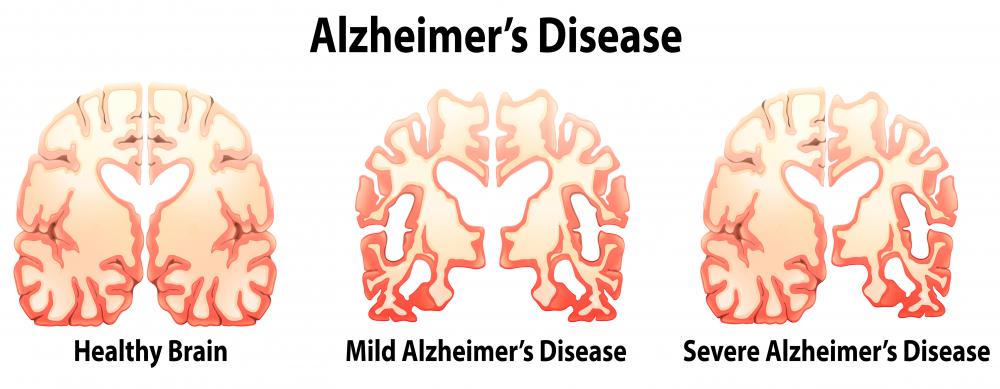At WiseGEEK, we're committed to delivering accurate, trustworthy information. Our expert-authored content is rigorously fact-checked and sourced from credible authorities. Discover how we uphold the highest standards in providing you with reliable knowledge.
What Is Frontal Lobe Degeneration?
Frontal lobe degeneration is a form of injury to the frontal lobe of the brain where one or both frontal lobes starts to atrophy. Degenerative conditions like this are progressive and will get worse over time. A number of conditions can cause frontal lobe degeneration, and the most appropriate treatment approach can vary. If a patient starts to display symptoms, a doctor may recommend a thorough neurological consult to learn more about the patient's brain and baseline level of cognitive function.
Patients with this degeneration can experience an early onset, especially if it is related to drug or alcohol abuse. Conditions like Pick's disease and primary progressive aphasia, both associated with frontal lobe degeneration, typically show up earlier than Alzheimer's disease but are sometimes mistaken for it. Patients can also develop this condition in association with movement disorders like Parkinson's or amyotrophic lateral sclerosis (ALS). Sometimes the condition is mistaken for mental illness like schizophrenia, and it is important to consider this as a possible diagnosis if a patient does not respond as expected to mental health treatment.

In frontal lobe degeneration, patients start to develop behavioral changes. Their memory often remains intact, but they can experience behavioral outbursts and problems with their social skills. Some patients may have trouble with critical thinking and reasoning. They also lack motivation to engage in tasks like routine daily activities. Some patients have aphasia and may develop movement disorders, especially fine motor disorders that make it hard to control the hands.

Signs of degeneration may be visible on a medical imaging study. A doctor may recommend some tests to find out what caused the damage to the frontal lobe. While it is not possible to reverse brain damage, patients may be able to arrest the degeneration with treatment. They can also receive appropriate therapy to recover skills. Therapy may include sessions with psychologists to develop coping techniques as well as physical therapy to improve coordination.

A patient with frontal lobe degeneration can have a variable prognosis. Some patients may stabilize and could maintain independent living skills, though they may require some support with age. Other patients have severe and rapidly progressing dementia. They may need hospitalization and extended inpatient care. These patients may be eligible for financial assistance on the grounds that the brain damage is a disability. Patients with work-related or service-linked disease may want to consider filing a claim against their former employers to receive compensation and additional benefits.
AS FEATURED ON:
AS FEATURED ON:

















Discuss this Article
Post your comments